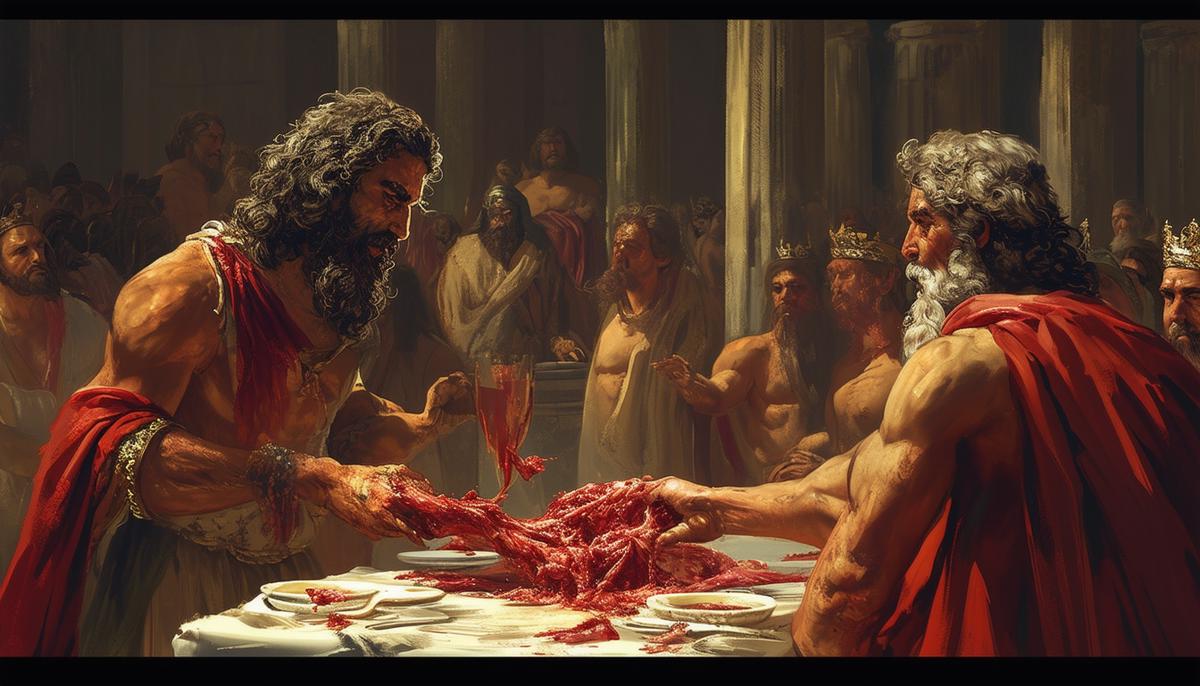Origins and Family
King Lycaon, a notorious character in Greek mythology, was the son of Pelasgus, who either sprang from the soil of Greece or was the progeny of Zeus and Niobe. Lycaon's mother was either Meliboea, an Oceanid, or Cyllene, a mountain nymph. Some legends suggest that Meliboea and Cyllene might be the same woman, embodying both the allure of the ocean and the mystery of the mountains.
Lycaon ruled Arcadia and fathered numerous sons by several wives. These sons, creators of surnames and founders of towns, practically mapped Arcadia, establishing hamlets and making history under every olive tree they shaded.

Rule and Civilization in Arcadia
King Lycaon left an indelible mark on Arcadia, shaping the societal landscape of ancient Greece. He founded the city of Lycosura, often touted as "the oldest city in the world," and introduced the concept of centralized dwellings and artisan touches.
In matters divine, Lycaon introduced the worship of Zeus Lycaeus, giving Arcadia an official patron deity. This worship included the Lykaia festival, which, according to some myths, might have involved human sacrifice during the feasts.1

The Infamous Banquet and Transformation
When King Lycaon decided to host a banquet for Zeus, he hatched a plan to serve human flesh to the divine guest, disguised as a mortal. Lycaon's aim was to test Zeus' true godhood, presuming that an all-seeing god would catch such a misdeed.
In the midst of the haunting meal, Zeus discovered the deception and, in a fit of indignation, flipped the dinner table and stormed out. As punishment for this effrontery to guest rights and to Zeus himself, Lycaon was transformed into a wolf, setting a precedent for mythological punishments.2
This transformation raises questions about morality and the consequences of defying cosmic laws. Through figures like Lycaon, Greek mythology explored humanity's foibles and follies, serving as a warning to mortals who might cross the line.

Legacy and Mythological Impact
Lycaon's story has left a lasting impact on our cultural landscape, particularly in the realm of werewolves and lycanthropy. As one of the earliest examples of a man transforming into a beast, Lycaon's tale resonates within Greek mythology, where metamorphosis became a favored plot device for divine punishment or protection.
In modern times, reflections on Lycaon have evolved to focus more on psychological symbolism and moral conflicts. Literary figures and characters in various media often grapple with their dual natures, echoing the struggle that Lycaon himself faced.
Lycaon's legacy extends beyond the horror genre, as his story ignites an exploration into human nature and the wildness that lurks within us. His reach is both grisly and didactic, reminding us of the enduring power of mythology to mirror our deepest fears and highest aspirations.

In the grand theater of Greek mythology, Lycaon stands out not just for his infamous banquet or his transformation into a wolf, but for what these stories teach us about human nature. His legacy challenges us to consider the thin line between civilization and savagery, a theme as relevant today as it was in ancient times. Through Lycaon's story, we are reminded of the enduring power of mythology to mirror our deepest fears and highest aspirations.
- Burkert W. Homo Necans: The Anthropology of Ancient Greek Sacrificial Ritual and Myth. University of California Press; 1983.
- Ovid. Metamorphoses. Translated by Melville AD. Oxford University Press; 1986.

Leave a Reply